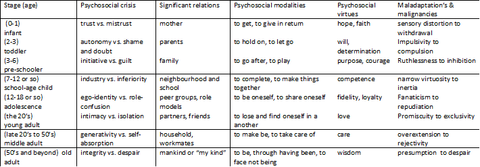Fichas sobre Erik Erickson & Horney, creado por rachael.mitterfe el 04/06/2013.
Pineado a
126
3
0
Sin etiquetas
|
|
Creado por rachael.mitterfe
hace más de 11 años
|
|
Cerrar
|
|
Creado por rachael.mitterfe
hace más de 11 años
|
|

Erickson, in a nutshell, believed that at each stage of life we are faced with a specific crisis/psychosocial dilemma. The resolution of each dilemma creates a new balance between the person and their social world. Early unfavourable outcomes can throw things out of balance and affect the dealing with later crises. Sequential "successes" in each 'developmental milestone' develop a healthy personality & satisfying life.

Horney was more focused on social aspects and motivations of personality. He didn't agree with Freuds views concerning women (believed that womens feelings of inferiority stemmed from social factors, e.g. the emphassis on securing the love of a man. Women want masculine autonomy & control), penis envy and neurosis. Horney posited that childrens most significant discovering was that of his/her own helplessness. He emphasised the importance of individual self-realisation and growth, as well as a warm, stable family and larger society and culture.
Neo-Psychoanalytical: Erikson
Erikson developed his own theory about personality development from a lifespan perspective, in which he refered to a series of psychosocial stages. He differed from Psychoanalytical Theory by focusing less on pschosexual stages, more on conscious thought and interpersonal relations. Unlike Freud's stages which ended early, Erikson's stages continued througout life. He focused on Identity Crisis (sense of self) & male-female differences in Personality.

 Ocultar las fichas que te sabes
Ocultar las fichas que te sabes